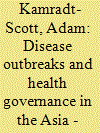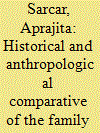| Srl | Item |
| 1 |
ID:
095036


|
|
|
| 2 |
ID:
141718


|
|
|
|
|
| Summary/Abstract |
The article tracks the evolution of the family planning programmes in India and China and the conceptual linkages between the two. This comparison, in turn, serves as an entry point for studying the following:
The role that the family plays in becoming the site of governance and deploying state-led capitalism in the two countries.
The assumptions behind the development trajectories in both countries.
What are the ways in which the policies amplified patrilineal hierarchies within families to produce the disturbing outcome of the missing girl child—this even as the family planning policies became constrained as they were acting within a cultural milieu of patriarchy.
The article uses studies and commentaries across disciplines, such as, historical demography and anthropology to situate its arguments. The conclusion it attempts to put forth is that the small family norm was operationalised in various differing ways in both states, and yet the commonalities that arose were the following:
The declining sex ratio in both states as an immediate repercussion of the enforcement of the small family norm.
The structuring of the health services around the family planning operations.
The small family norm becoming an end in itself, as a mode of reaching a level of development akin to the West, and as an ethic for modernising nations.
|
|
|
|
|
|
|
|
|
|
|
|
|
|
|
|
| 3 |
ID:
116676


|
|
|
|
|
| Publication |
2012.
|
| Summary/Abstract |
Globalization has led to new health challenges for the twenty-first century. These new health challenges have transnational implications and involve a large range of actors and stakeholders. National governments no longer hold the sole responsibility for the health of their people. These changes in health trends have led to the rise of global health governance as a theoretical notion for health policy making. The Southeast Asian region is particularly prone to public health threats such as emerging infectious diseases and faces future health challenges including those of noncommunicable diseases. This study looks at the potential of the Association of Southeast Asian Nations (ASEAN) as a regional organization to lead a regional dynamic for health cooperation in order to overcome these challenges. Through a comparative study with the regional mechanisms of the European Union (EU) for health cooperation, we look at how ASEAN could maximize its potential as a global health actor. Our study is based on primary research and semistructured field interviews. To illustrate our arguments, we refer to the extent of regional cooperation for health in ASEAN and the EU for (re)emerging infectious disease control and for tobacco control. We argue that regional institutions and a network of civil society organizations are crucial in relaying global initiatives, and ensuring the effective implementation of global guidelines at the national level. ASEAN's role as a regional body for health governance will depend both on greater horizontal and vertical integration through enhanced regional mechanisms and a wider matrix of cooperation.
|
|
|
|
|
|
|
|
|
|
|
|
|
|
|
|